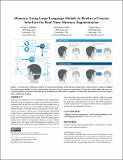Memoro: Using Large Language Models to Realize a Concise Interface for Real-Time Memory Augmentation
Author(s)
Zulfikar, Wazeer Deen; Chan, Samantha; Maes, Pattie
Download3613904.3642450.pdf (1006.Kb)
Publisher with Creative Commons License
Publisher with Creative Commons License
Creative Commons Attribution
Terms of use
Metadata
Show full item recordAbstract
People have to remember an ever-expanding volume of information. Wearables that use information capture and retrieval for memory augmentation can help but can be disruptive and cumbersome in real-world tasks, such as in social settings. To address this, we developed Memoro, a wearable audio-based memory assistant with a concise user interface. Memoro uses a large language model (LLM) to infer the user’s memory needs in a conversational context, semantically search memories, and present minimal suggestions. The assistant has two interaction modes: Query Mode for voicing queries and Queryless Mode for on-demand predictive assistance, without explicit query. Our study of (N=20) participants engaged in a real-time conversation, demonstrated that using Memoro reduced device interaction time and increased recall confidence while preserving conversational quality. We report quantitative results and discuss the preferences and experiences of users. This work contributes towards utilizing LLMs to design wearable memory augmentation systems that are minimally disruptive.
Description
CHI '24: Proceedings of the CHI Conference on Human Factors in Computing Systems May 11–16, 2024, Honolulu, HI, USA
Date issued
2024-05-11Department
Massachusetts Institute of Technology. Media LaboratoryPublisher
ACM
Citation
Zulfikar, Wazeer Deen, Chan, Samantha and Maes, Pattie. 2024. "Memoro: Using Large Language Models to Realize a Concise Interface for Real-Time Memory Augmentation."
Version: Final published version
ISBN
979-8-4007-0330-0
Collections
The following license files are associated with this item: